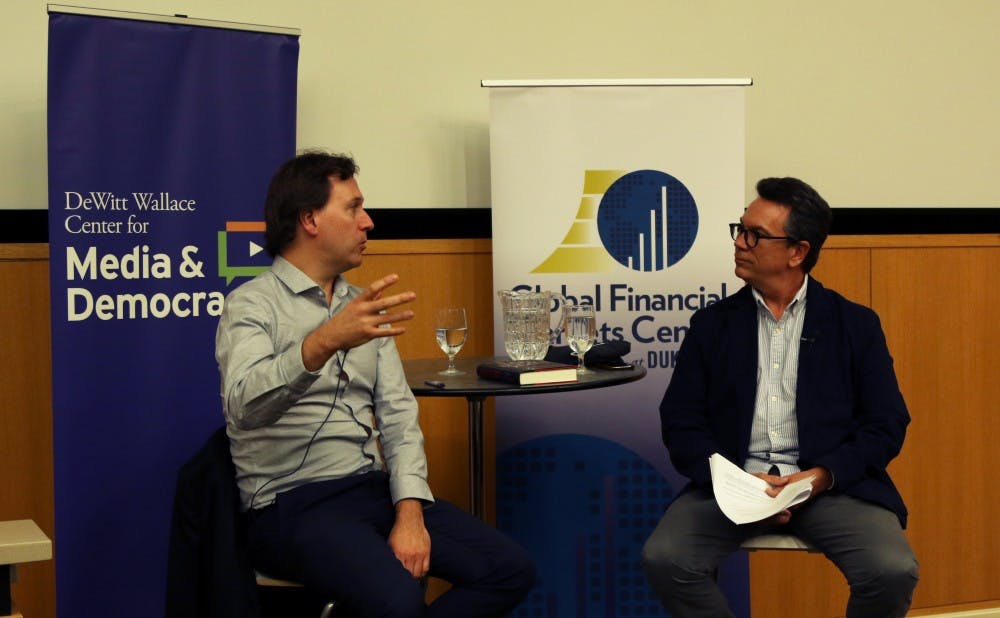At just 19 years old, Elizabeth Holmes dropped out of Stanford University to revolutionize the health care industry—not knowing that years later, she would be embroiled in criminal charges.
Holmes dropped out of college to create Theranos, a portmanteau of the words “therapy” and “diagnosis.” The company would develop a medical device that could allegedly perform hundreds of blood tests from just a few drops of blood drawn by a finger prick.
Holmes branded herself as a female Steve Jobs, wearing black turtlenecks and describing her invention as “the iPod of blood testing.”
Her aspirations were not unlike those of many Duke students who hope to become the next Mark Zuckerberg. However, the Silicon Valley “fake it ‘til you make it” culture destroyed Holmes, John Carreyrou explained at a Wednesday event.
Carreyrou, Trinity '94 and a two-time Pulitzer Prize winning reporter for The Wall Street Journal, exposed Theranos for defrauding investors, doctors and patients in an investigation published last October. Since then, he has written a book about Theranos titled "Bad Blood: Secrets and Lies in a Silicon Valley Startup."
Carreyrou grew up in Paris, where his father worked as a prominent broadcast journalist. At Duke, he majored in political science, but didn’t write seriously until after he graduated. He got his first job at the Journal in 1999 and started as a foreign correspondent based in Brussels and later Paris before moving to New York.
The central characters in his account are Holmes alongside her ex-boyfriend and second-in-command Sunny Balwani, a businessman and investor 19 years her senior who got rich quick during the dot-com boom.
Holmes and Balwani kept a tight rein on the company. They demanded complete loyalty from their employees and were perpetually paranoid that proprietary information about their blood testing device would be leaked.
Although Holmes didn’t have a medical background, she successfully raised millions of dollars to fund Theranos. She also cultivated an impressive board of directors that included respected venture capitalist Don Lucas, former Secretary of State George Shultz and prominent lawyer David Boies.
“She was a believer in her own dream and that was contagious,” Carreyrou said.
However, when the technology didn’t keep pace with Holmes’s vision, she started to cut corners. Carreyrou said that Holmes and Balwani crossed a “bright red line” when they commercialized the dysfunctional device in the fall of 2013, rolling out the so-called miniLab in Walgreens stores in Arizona and California.
Carreyrou’s exposé sent shock waves across the country. His book has sold 234,000 copies to date, and plans for a movie adaptation are underway. Adam McKay, the director of "The Big Short," has signed on to direct the film, and Jennifer Lawrence will play Holmes.
Just a few weeks after his book was released, Holmes and Balwani were each charged with two counts of conspiracy to commit wire fraud and nine counts of wire fraud.
Carreyrou said the the criminal proceedings will mark the final chapter in the Theranos saga and set a precedent for the treatment of startup founders who ignore ethics to make it big in Silicon Valley.
“If she gets off after everything that’s happened—the hundreds of millions of dollars that were defrauded from investors, but also the way patients were put in harm’s way—it could be a signal to Silicon Valley that it’s business as usual,” he said. “On the other hand, if she does get convicted and she does prison time, it would be a wake-up call.”
Get The Chronicle straight to your inbox
Signup for our weekly newsletter. Cancel at any time.

